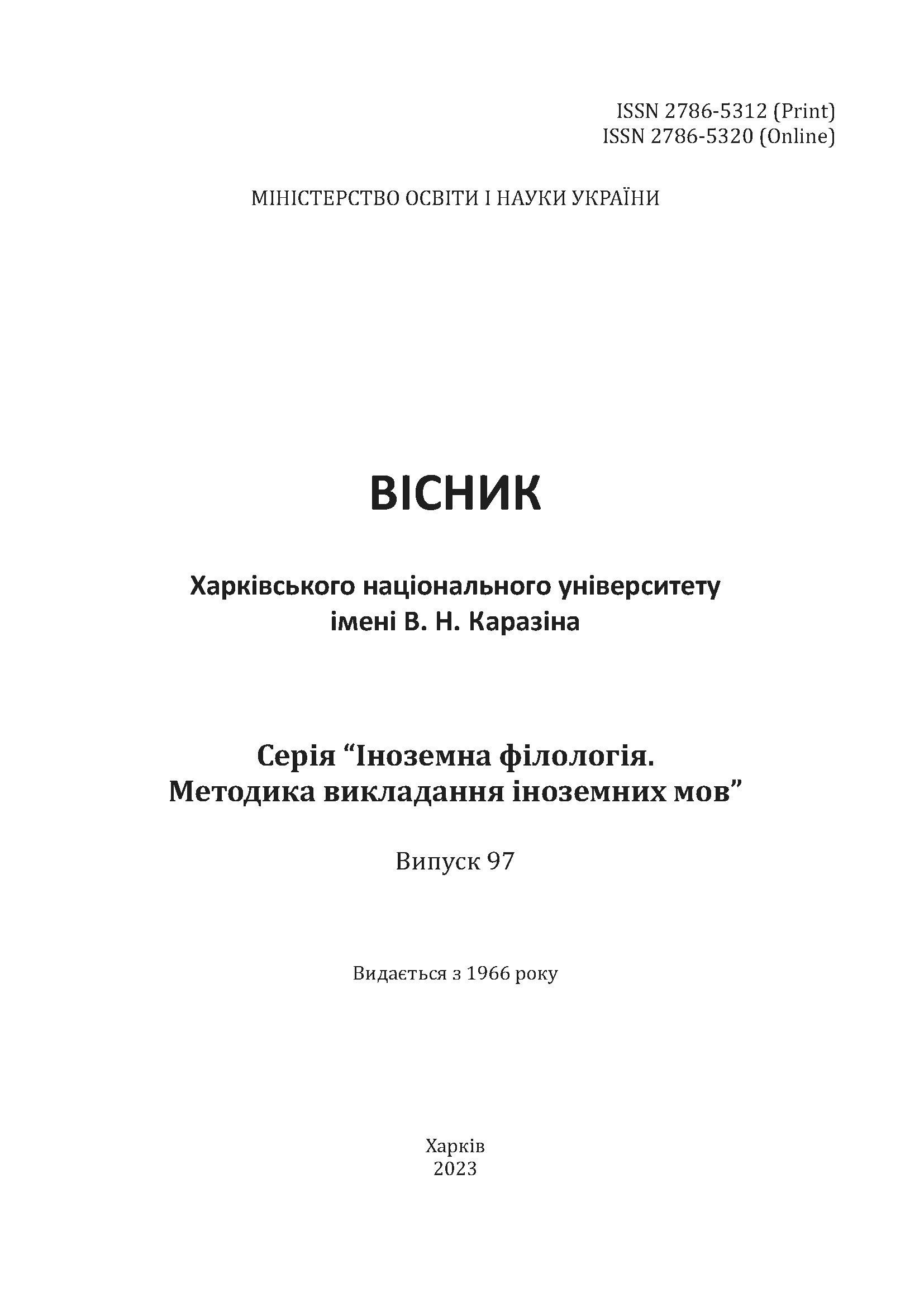Джерела впливу на передачу біблійних географічних назв українською мовою. Частина 1
Анотація
Розглянуто збіги та розбіжності передачі географічних назв у найпоширеніших перекладах Біблії українською мовою. Матеріалом дослідження послужили 172 географічні назви із тексту Старого Заповіту (Книги «Буття», «Вихід», «Числа» та «Повторення закону») в перекладах з давньогебрейського оригіналу, а також синодального та англомовного текстів-посередників. З метою згаданого аналізу усі 172 одиниці було розподілено на шість категорій, залежно від ступеня збігу їхнього написання українською мовою, де в категорії 1 передача власної назви збігається в усіх версіях перекладу, а в категорії 6 – не збігається у жодній із шести його версій. Інші категорії відрізнялися різним співвідношенням часток такого збігу. У цій статті розглядаються результати аналізу перших чотирьох категорій, враховуючи які можна зробити попередній висновок, що частина досліджених перекладачів орієнтувалися переважно на українську традицію (зафіксовану в перекладах І. Огієнка та І. Хоменка), навіть коли вони перекладали не з давньогебрейського оригіналу, а з інших текстів-посередників, зокрема, англомовного (Біблія Нового Світу). Філарет переважно знаходився під впливом синодального перекладу, лише епізодично орієнтуючись на українську традицію. З іншого боку, такі перекладачі як Огієнко, Хоменко та Гижа мають виразно українську орієнтацію, спираючись на багаторічні традиції вітчизняного перекладу. Окремо стоїть переклад Турконяка, який дотримується авторських принципів передачі власних назв, що робить його переклад несхожим у цьому відношенні на жодну іншу традицію. Враховуючи безумовну ерудицію та кваліфікацію цього перекладача, можна припустити, що саме його інновації є найціннішими в сучасній інтерпретації текстів Святого Письма.
Завантаження
Посилання
Bibla, S. V. (1997). Sklad, dzherela i shliakhy formuvannia ukraiinskoii tserkovnoii terminolohiii (nazvy tserkovnykh chyniv i posad). (Avtoreferat kandydatskoi dysertatsii) [Ukrainian church-related terminology: Composition, sources and ways of formation. [Philology PhD thesis synopsis]. – Taras Shevchenko Kyiv National University (in Ukrainian).
Bibliia. Knyhy Sviaschennoho Pysannia Staroho i Novoho Zavitu: v ukrains’komu perekladi z paralel’nymy mistsiamy (2004). Pereklad Patriarkha Filareta (Denysenka).
(The Bible. Books of the Holy Scriptures of the Old and New Testament: in Ukrainian translation with parallel passages (2004). Translation by Patriarch Filaret (Denysenko). Kyiv: Publication of the Kyiv Patriarchate of the Ukrainian Orthodox Church-Kyivan Patriarchate (in Ukrainian).
Bibliia. Pereklad Novoho Svitu ukrains’koiu movoiu (2014). (The Bible. New World Translation into Ukrainian). (in Ukrainian). Retrieved from: httpp//vvv.jv.org. (in Ukrainian).
Bibliia abo Knyhy Sviatoho Pysma Staroho i Novoho Zapovitu (2015). Iz movy davnoyevreiskoii i gretckoii na ukrayinsku doslivno nanovo perekladena (pereklad profesora I. Ohienko) [Bible or Books of Holy Scripture of Old and New Testaments anew translated into Ukrainian from Old Hebrew and Greek by Professor Ivan Ohienko]. Kyiv: Ukrainian Bible Society. (in Ukrainian).
Bibliia (2011) (chetvertyi povnyi pereklad z davnogretskoii movy), pereklad iieromonakha o. Rafaiila (Romana Turkoniaka) [Bible, fourth full translation into Ukrainian from Old Greek by father Rafail (Roman Turkoniak)]. Lviv: Ukrainian Bible Society. (in Ukrainian).
King James Version of the Bible. Retrieved from: (in English).
Matsko, L. I., Sydorenko, O. M. & Matsko, O. M. (2003). Stylistyka ukraiinskoii movy [Stylistics of the Ukrainian Language]. Kyiv: Vyshcha shkola Publ. (in Ukrainian).
Moroz, Y. A. (2017). Natsionalna tradytsiia bibliinykh perekladiv: filosofsko-relihiieznavchyi analiz. (Dys. dokt. filosof. nauk) [National Tradition of Bible Translation: Philosophic and Religious Aspects Analysis. (Philosophy Dr.Sc. thesis]. Zhytomyrskyi derzhavnyi universytet imeni Ivana Franka (in Ukrainian).
Novitnii pereklad Bibliyi Oleksandra Hyzhi (2013). [New Translation of the Bible by Oleksandr Hyzha]. Kyiv: Druk KT Zabelina- Filkovska Publ. (in Ukrainian).
Piddubna, N. V. (2000). Formuvannia nomenklatury nazv relihiinykh sporud v ukrayinskii movi. (Avtoreferat kandydatskoi dysertatsii) [Formation of the religious buildings names nomenclature in the Ukrainian language. [Philology PhD thesis synopsis]. Kharkivskyi derzhavnyi universytet imeni H.S.Skovorody (in Ukrainian).
Ponomariv, O.D. (1993). Stylistyka suchasnoii ukrayinskoii movy [Stylistics of Modern Ukrainian]. Kyiv: Lybid Publ. (in Ukrainian).
Puriaieva, N. V. (2001). Formuvannia ukrainskoii tserkovno-obriadovoii terminolohiyi (nazvy bohosluzhbovykh predmetiv). (Avtoreferat kandydatskoi dysertatsii) [Formation of Ukrainian church ceremonial terminology (names of church ceremonial objects). [Philology PhD thesis synopsis]. Taras Shevchenko Kyiv National University (in Ukrainian).
Shevchenko, L. L. (2007). Konfesiinyj styl [Confessional style]. Ukrayinska mova: Entsyklopediia. The Ukrainian language: Encyclopedia. 284 (in Ukrainian).
Sviate Pysmo Staroho i Novoho Zavitu (2007). Povnyi pereklad, zdijsnenyi za oryhinalnymy yevrejskymy, arameiskymy ta gretskymy tekstamy pid chas Druhoho Vatykanskoho Vselenskoho Soboru [pereklad o. Ivana Khomenka]. [Holy Scripture of Old and New Testaments. Full translation by Father Ivan Khomenko from the original Hebrew, Aramaic and Greek during the Second Ecumenical Council in Vatican]. Zhovkva: Misioner Publ. (in Ukrainian).
Tymoshyk, H. (2004). Bibliina proprialna leksyka v perekladi Sviatoho Pysma P. Kulisha ta I. Puliuia [Bible proprietary lexis in the translation of Holy Scripture by P.Kulish and I.Puliui]. Visnyk Lviv. un-tu, Seriia «Filolohiia». Ivan Franko Lviv National Univ. Messenger, 34(2), 204-208. (in Ukrainian).




